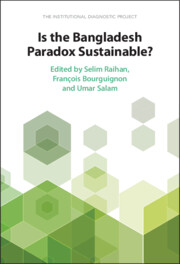Figures
2.3Bangladesh’s labour productivity by sector and for the whole economy (GDP per worker 2018 = 100)
2.4Percentage contribution to labour productivity growth in Bangladesh
2.7Current account, foreign debt, and foreign aid as a share of GDP, 1990–2018
3.2Scatter plot of the democracy synthetic index against (log) GDP per capita
3.4Distribution of questions by average score – all questions
3.9Percentage difference (absolute) in responses by political affinity
4.1The evolution of exports and GDP in real terms (1990 = 100)
4.2Bangladesh appears to be a major outlier in the association between textiles and clothing share in manufacturing and manufacturing share in GDP
4.3Minimum monthly wage for garment workers in 2018 (measured in US$)
5.2Trend in the lending interest rate, interest rate spread, and real interest rate
5.3Distribution of the efficiency score of private banks by year
5.6The interaction of government guarantees and supervisory approach
6.4Tax performance in comparable countries in 2017 (per capita income US$ 1,000–US$ 2,000)
7.2Share of institutes by type of management authority in 2018 (%)
7.3The complex coexistence of various actors in government primary education in Bangladesh
7.4Estimated average years of schooling, adults 25 and over, males and females, Bangladesh and other Asian countries
8.1Land administration and management structure in Bangladesh
8.3A schematic presentation of the complexities in land administration, and their consequences

